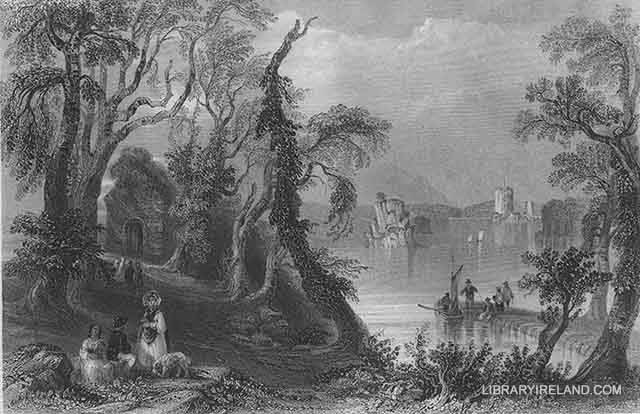Innisfallen Island, Killarney
From Ross Island I took boat to INNISFALLEN ISLAND, and on the way was shown a small islet of rock, with one side nearly twenty feet perpendicular above the water, called O'Donaghoe's Prison. Here the famous old prince, immortalised in song and legend, is said to have confined a disobedient son and some of his rebellious associates. In what age this great dynast of the lakes flourished cannot be easily determined, but that a distinguished hero of that name once did reign over this favoured region it would be heresy to dispute. According to tradition, he was a powerful and beneficent monarch; his arm was strong in the fight, and the words of wisdom were on his lips in the council. But the life of this good prince was doomed to terminate while still in the pride of his manhood, and the full lustre of his renown and glory. There are two traditions, in which the manner of his death is differently related; one asserts, that, while sitting surrounded by his subjects at a banquet, he became suddenly spiritualised, and descending, "as some light vision," to the neighbouring lake, plunged into its crystal waters and vanished from their sight. It is believed that he quits, at times, the regions of immortal bliss, and appears in person among the descendants of his people. His appearance is regarded as an omen of prosperity to whoever beholds him; he is generally seen mounted on a gallant white steed, bounding over the lake; but he is sometimes beheld on the green shores, contending in the mimic fight, or treading the stately measure of the ancient Irish dance.
As I approached Innisfallen, the woods, which at a distance seemed impenetrably dense, opened in glades and alleys. The trees are of larger growth than common, the ash and holly apparently thriving to the best advantage; the arbutus also flourishes here in abundance, and not only contributes to the beauty of the lakes, but to the wealth of the people, who manufacture a variety of pretty toys of its wood, and endeavour to convince the traveller that salmon broiled over an arbutus fire possesses a delicious flavour, which cannot be imparted to the fish by any other mode of cooking,—the consent to the experiment involving employment for half a day, with other etceteras, to the well-practised boatmen of the lake. Innisfallen, though a mere ruin at present, was once the seat of an order of monks distinguished in the ecclesiastical history of Ireland. It was founded by St. Finan Lobhra, or the Leper, some time about the commencement of the seventh century. The abbey church consisted of a single aisle, seventy feet long and twenty wide; and from the narrowness of the few windows which can now be traced, it must, like most of the very ancient churches in Ireland, have been extremely dark. The architecture of the cloister is exceedingly rude, but though much dilapidated, the limits of its covered walk, and the apertures opening into the interior area, may be still distinctly traced. At a short distance from the principal ruins there are three other buildings, which, it is said, belonged to the abbey; but the most interesting of all the remains of antiquity at this place is a small chapel or oratory, covered with ivy, which stands on a mass of rocks close to the water.

